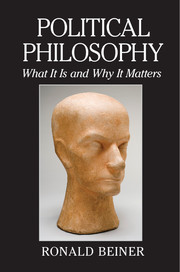Book contents
- Frontmatter
- Dedication
- Contents
- First Prologue: Horizons of Political Reflection
- Second Prologue: Freud, Weber, and Political Philosophy
- 1 Hannah Arendt: The Performativity of Politics
- 2 Michael Oakeshott: Life’s Adventure
- 3 Leo Strauss: The Politics of Philosophy
- 4 Karl Löwith: In Awe of the Cosmos
- 5 Excursus on Nature and History in the Strauss-Löwith Correspondence
- 6 Eric Voegelin: Modernity’s Vortex
- 7 Simone Weil: The Politics of the Soul
- 8 Hans-Georg Gadamer: Philosophy without Hubris
- 9 Jürgen Habermas: Politics as Rational Discourse
- 10 Michel Foucault’s Carceral Society
- 11 Alasdair MacIntyre: Fragmentation and Wholeness
- 12 Short Excursus on the Rise and Decline of Communitarianism as a Political Philosophy
- 13 John Rawls and the Death of Political Philosophy
- 14 Richard Rorty: Knocking Philosophy off Its Pedestal, or the Death of Political Philosophy Postmodernized
- Epilogue: On Not Throwing in the Towel
- Index
- References
10 - Michel Foucault’s Carceral Society
Published online by Cambridge University Press: 05 August 2014
- Frontmatter
- Dedication
- Contents
- First Prologue: Horizons of Political Reflection
- Second Prologue: Freud, Weber, and Political Philosophy
- 1 Hannah Arendt: The Performativity of Politics
- 2 Michael Oakeshott: Life’s Adventure
- 3 Leo Strauss: The Politics of Philosophy
- 4 Karl Löwith: In Awe of the Cosmos
- 5 Excursus on Nature and History in the Strauss-Löwith Correspondence
- 6 Eric Voegelin: Modernity’s Vortex
- 7 Simone Weil: The Politics of the Soul
- 8 Hans-Georg Gadamer: Philosophy without Hubris
- 9 Jürgen Habermas: Politics as Rational Discourse
- 10 Michel Foucault’s Carceral Society
- 11 Alasdair MacIntyre: Fragmentation and Wholeness
- 12 Short Excursus on the Rise and Decline of Communitarianism as a Political Philosophy
- 13 John Rawls and the Death of Political Philosophy
- 14 Richard Rorty: Knocking Philosophy off Its Pedestal, or the Death of Political Philosophy Postmodernized
- Epilogue: On Not Throwing in the Towel
- Index
- References
Summary
It is hard to live in a society while thinking that the society, in virtually every aspect of its being, is a prison. The work of Michel Foucault shows that while it may be hard, it is not impossible. To be sure, this view is not unique to Foucault. Adorno, too, for instance, speaks of “the open-air prison which the world is becoming.” But Foucault surely went further than anyone else in building this conception into a full-fledged political philosophy.
The first thing to be said about Discipline and Punish (Surveiller et Punir) is that it is vastly more relevant to the world in which we are currently living (a post-9/11 world informed by ubiquitous concerns about security and surveillance) than the book was when first published (1975). When I stand in line at the cafeteria in the building where I have my university office, to pay for my lunch, a sign on the way to the cashier reads: “WARNING. YOU ARE UNDER SURVEILLANCE. THESE PREMISES ARE PROTECTED BY 24 HOUR VIDEO SURVEILLANCE.” As the original French title rightly conveys, although Foucault’s book is a history of the modern prison, the idea of surveillance is conceptually prior to (or more primordial than) the notion of punishment. What preoccupies Foucault is not that modern societies punish delinquents, which of course premodern societies did as well, but the fact that they punish in a mode of penetrating surveillance, where in effect the gaze of the punishing apparatus is more dehumanizing than confinement or loss of liberty (or so at least Foucault’s critical analysis seems to suggest). In a sense, Foucault’s idea is that the surveillance that is part and parcel of modern punishment is worse than the punishment itself, or captures more fundamentally the basic nature of the “carceral society” in which we live. If that is so, then all of us, not just the delinquents and outcasts, are diminished or dehumanized by the omnipresent gaze of the authorities that monitor us, that track our movements and keep video records of our every step.
- Type
- Chapter
- Information
- Political PhilosophyWhat It Is and Why It Matters, pp. 151 - 167Publisher: Cambridge University PressPrint publication year: 2014



